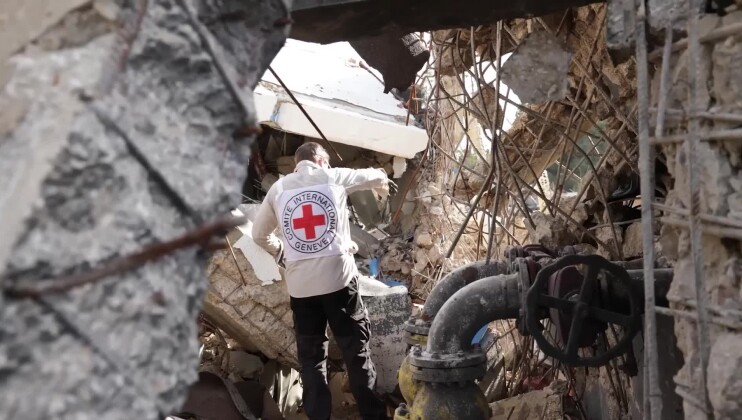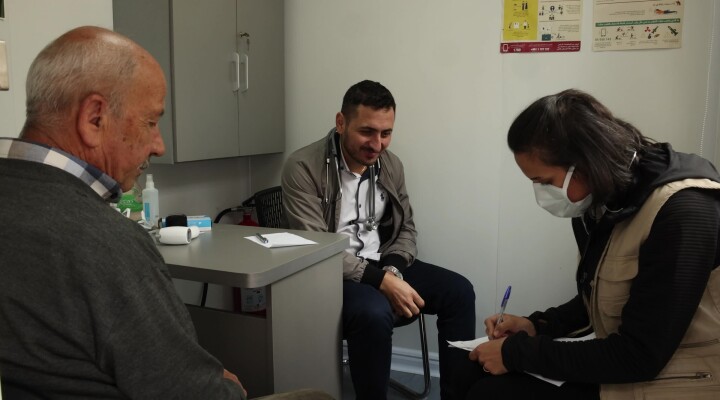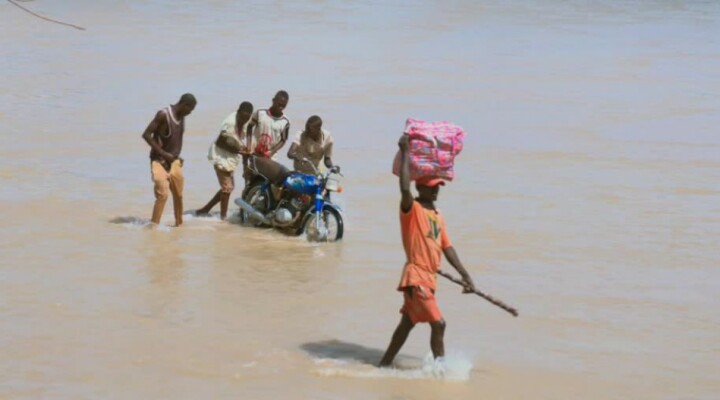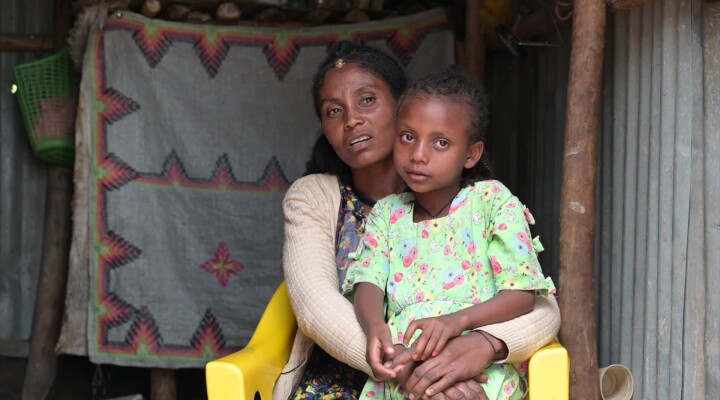Iraq: Hospitals close to Mosul front lines
As the fight for Mosul intensifies, civilians are in the path of battle. With many more casualties expected in the coming weeks, the ICRC is supporting local hospitals and primary health care centres to treat the wounded.
Iraq has known little peace for years. Over three million Iraqis have already been displaced since the onset of the armed conflict in 2014. Now, as the fighting in and around the city of Mosul escalates, communities across the region have to prepare for war, again. The ICRC is supporting local medical facilities as they get ready to receive the wounded.
“This is Shikhan Hospital” explains ICRC’s spokesperson in Iraq, Sara Alzawqari. “It’s the only hospital in Nineveh province that is still working. It is receiving war wounded cases because of the on-going military operations. These wounded are from the areas which have been retaken.”
Once a local community hospital with just fifty beds, Shikhan Hospital is now opening its doors to anyone needing medical attention. But war injuries were not, until now, its day to day work.
“Of course Shikhan is a rather small hospital” says ICRC surgical nurse Haitham Daniel Al-Hasan. “Maybe not used to receiving a big number of war wounded, especially in this scenario. So our job here is to support them and to prepare them for the worst case.”
Already Shikhan Hospital’s wards are filling up with the wounded. No one takes sides here, those injured in war have a right to medical treatment, and that is exactly what this hospital is providing. As Dr. Hushyar Mustafa Omar explains, the only priority is to save lives.
“The hospital is providing medical care for the wounded from the conflict around Mosul. We receive everybody, civilians, army, Peshmerga, anyone who gets injured in the war.”
“We have received patients with shell wounds and gun shots” continues Dr Omar. “We are ready to receive any kind of wounds day and night. We have staff and doctors on shifts 24 hours.”
At first many of the new patients are young men wounded in battle. But civilians too are starting to arrive. Among them is Fadel, who is just 10 years old. He is here with his little sister, and his uncle. The family has suffered tragic loss.
“They were sitting at home when the shelling hit the house” explains Fadel’s uncle. “Two of his older brothers died, one was 16 years old and the other was 17, and their father also died.”
As the advance on Mosul continues, hospitals like the one in Shikhan will face huge challenges. As the fighting spreads, there will be more and more wounded, each, as Sara Alzawqari already knows, with a personal story of displacement, and loss.
“We have met many civilian casualties in the hospital, we met a lady whose house was hit and her son died. She’s currently waiting to be operated on.”
All around Mosul, and in the city itself, civilians live in the path of the warring parties. It is estimated up to a million people could flee as the fighting continues. That is why hospitals like the one in Shikhan should, and must, be protected. Hospitals, and the doctors and nurses in them, are neutral, and ready to treat everyone in need.
Facts & Figures:
- In Al Qayyarah, where communities were badly affected by fierce fighting in the past weeks, the ICRC managed to distribute emergency relief items such as food, blankets, personal hygiene items, detergents, cooking tools, and other essential items to over 10,000 people in the past few days and will distribute to an equal number this week.
- In Shikhan area, the ICRC was able to support the hospital in building two additional Operation Theatres to increase the latter’s capacity in treating people who require surgery. Moreover, ICRC doctors have been training the hospital’s staff on war surgery, chemical weapon decontamination, as well as first aid for war wounded patients. The hospital is also provided with medical surgical equipment as well as medical consumables by the ICRC. One ICRC surgeon and one ICRC nurse are embedded at the hospital to continue the on-the-job training and coaching program as the battle of Mosul continues.
- The ICRC has also been training emergency responders in the north on emergency first aid to help improve their response in treating and transporting casualties to nearby medical centres or hospitals.
SHOTLIST
Location: Iraq, various
Length: 3:51
Format: HD
AV ref: AV560N
Camera: Anmar Qusay and Ibrahim Sherkhan
Sound: English/Arabic
Location Al Qayyarah District
Date: 20.10.2016
0:00 – 0:04 Driving shot, oil fires burning
0:04 – 0:16 Driving shot, IDPs walking, mainly women and children
0:16 – 0:23 Driving shot, deserted war damaged town
Location Shikhan Hospital
Date: 2.11.2016
0:23 – 0:28 Exterior emergency department
0:28 – 0:46 Soundbite Sara Alzawqari, ICRC Spokesperson (Arabic original) ‘This is Shikhan Hospital” explains ICRC Spokesperson Sara Alzawqari. “It’s the only hospital in Nineveh province that is still working. It’s receiving war wounded cases because of the on going military operations. These wounded are from the areas which have been retaken.’
0:46 – 0:50 Interior corridor Shikhan hospital
0:50 – 0:56 Pan round operating theatre
0:56 – 1:08 Soundbite Haitham Daniel Al-Hasan, ICRC surgical nurse (English original). ‘Maybe not used to receive a big number of war wounded, especially in this scenario. So our job here is to support them and to prepare them for the worst case.’
1:08 – 1:18 Wounded soldiers eating in ward
1:18 – 1:25 Wounded soldier with IV drip
1:25 – 1:29 Wounded soldier sitting up eating
1:29 - 1:57 Soundbite Dr Hushyar Musatafa Omar (Arabic original) (note internal edits) ‘The hospital is providing medical care for the wounded from the conflict around Mosul. We receive everybody, civilians, army, Peshmerga, anyone who gets injured in the war. We have received patients with shell wounds and gun shots. We are ready to receive any kind of wounds day and night. We have staff and doctors on shifts 24 hours.’
1:57 – 2:03 Fadel in hospital bed crying
2:03 – 2:11 Fadel’s little sister
2:11 – 2:16 Fadel with his uncle comforting him
2:16 – 2:19 Fadel’s leg wound with dressing
2:19 – 2:30 Soundbite Fadel’s uncle (Arabic original) ‘They were sitting at home when the shelling hit the house. Two of his older brothers died, one was 16 years old and the other was 17, and their father also died.’
2:30 – 2:35 CU Doctor dressing wounded foot
2:35 – 2:41 Wide shot of the doctor dressing wounded foot
2:41 – 2:47 Young man with head wound sitting on hospital bed eating
Location Bartala
Date: 27.10.2016
2:47 – 2:52 Wide shot of destroyed street
2:52 – 2:55 Destroyed house
2:55 – 3:01 Another destroyed house
Location Shikhan Hospital
Date: 2.11.2016
3:01 – 3:15 Soundbite Sara Alzawqari, ICRC spokesperon (Arabic original) ‘We have met many civilian casualties in the hospital, we met a lady whose house was hit and her son died. She’s currently waiting to be operated on’.
Location Bartala
Date: 27.10.2016
3:15 – 3:19 Driving, village in distance, dust clouds
3:19 – 3:34 Driving through ruined village, massive destruction
3:34 – 3:37 exterior hospital
3:37 – 3:41 ambulances parked outside hospital
3:41 – 3:50 pull focus plant in foreground to artillery in background.
Download this footage from:
www.icrcvideonewsroom.org
For further information, please contact:
ICRC Baghdad: Sarah Alzawqari (+964) 7901916927, salzawqari@icrc.org
ICRC Erbil: Ralph El Hage (+964) 782 784 35 93, relhage@icrc.org
ICRC Geneva: Krista Armstrong, (+41) 79 447 37 26 karmstrong@icrc.org



